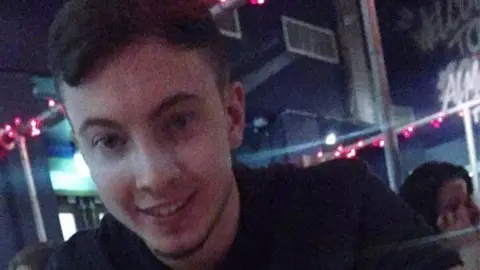Insomnia: 'My brother killed himself after sleep struggle'
 Family handout
Family handoutA woman whose brother took his own life after struggling with insomnia says she is trapped in a "living hell" as she tries to overcome her own sleep issues.
Charlene Marsden, 34, from Stockport, said she had been battling with insomnia for many years.
In 2019, her 22-year-old brother David killed himself after being unable to cope with not being able to sleep.
"Knowing that taking his life was David's only way out left me terrified," said Charlene.
She said she thought to herself: "Would the same happen to me?"
Charlene has decided to share David's story - as well as her own challenges - both in the hope of raising awareness of the impact insomnia can have on mental health and to encourage others to seek help.
In 2021 Charlene, who works in marketing and has a 14-year-old daughter, said she barely slept for three weeks.
"I ran on adrenaline for the first few weeks but then I felt really zombified," she explained.
"I'd be sat at the computer at work, falling asleep.
"I got into a vicious cycle of panicking about if I was going to sleep the coming night and never did."
 Family handout
Family handoutCharlene recalled how she was unable to eat and would gag when she tried to consume food.
"I felt physically ill because I was so exhausted," she said.
Charlene's GP signed her off sick for six months and she was offered antidepressants.
She said she did not want to go down that route and now tries to follow best practice to ensure a healthy sleep regime. She also takes a magnesium supplement.
"I'm not depressed," she said. "I just want to sleep like a normal person.
"The anxiety comes from not being able to sleep; it's not the root cause."

If you are affected by any of the issues in this article you can find details of organisations that can help via the BBC Action Line.

Two years earlier, her brother flew home from a family holiday after starting to suffer from severe insomnia, a condition with which he had struggled on previous occasions.
Charlene insisted her brother's subsequent rapid mental health deterioration was caused by a lack of sleep rather than any other cause of depression.
"When we got back a week later he still wasn't sleeping," Charlene said.
"He was anxious all the time.
"He said: 'I can't carry on like this, there is no way out, I just want to go to sleep and never wake up' and he was then sectioned."
David took his own life during the first night of a week's home leave.
"My mum found him on the settee in the morning," said Charlene.
"And this is because of sleep. People need to understand that sleep is a major issue."

What is insomnia?
You have insomnia if you regularly:
- Find it hard to go to sleep
- Wake up several times during the night
- Lie awake at night
- Wake up early and cannot go back to sleep
- Still feel tired after waking up
- Find it hard to nap during the day even though you're tired
- Feel tired and irritable during the day
- Find it difficult to concentrate during the day because you're tired

Sleepstation is a sleep improvement programme that works with both NHS and private patients.
Its director of sleep science, Dr Neil Stanley, said good sleep was "vital for good physical mental and emotional health".
"As Charlene's story shows, when we don't sleep well and feel that there is nothing we can do, the consequences can be devastating," he said.
"We enter a vicious cycle - when we don't sleep, we find it harder to cope with what is going on in our lives, which can cause us to become depressed or anxious about our cares and worries.
"This then further exacerbates the sleep problem."
He said that while it might seem impossible to break this cycle "therapies exist that can help people sleep better".
"Sadly, few people seem to be aware that such therapies exist and many people are suffering unnecessarily, which is why we're trying to raise awareness for support that is available."

Why not follow BBC North West on Facebook, Twitter and Instagram? You can also send story ideas to [email protected]
